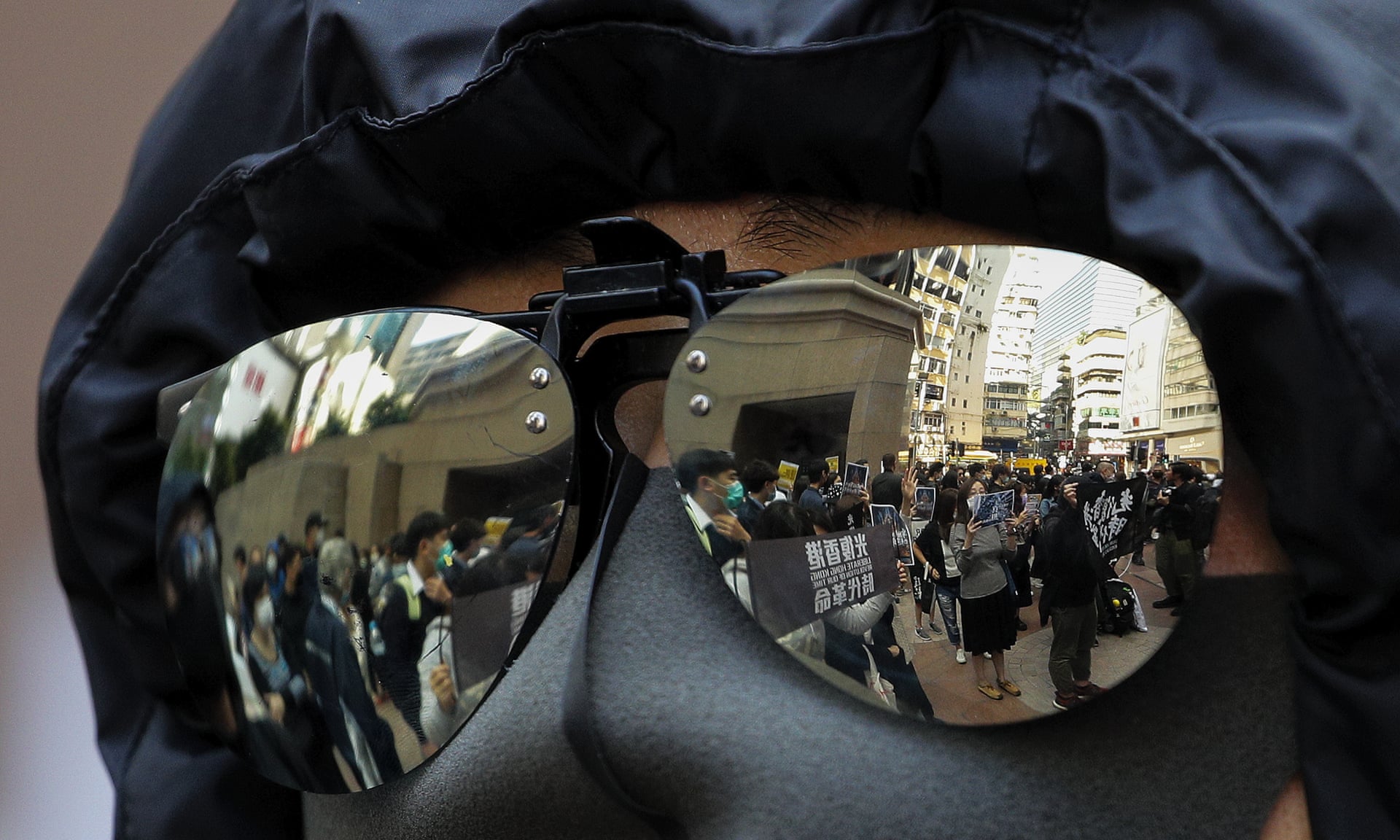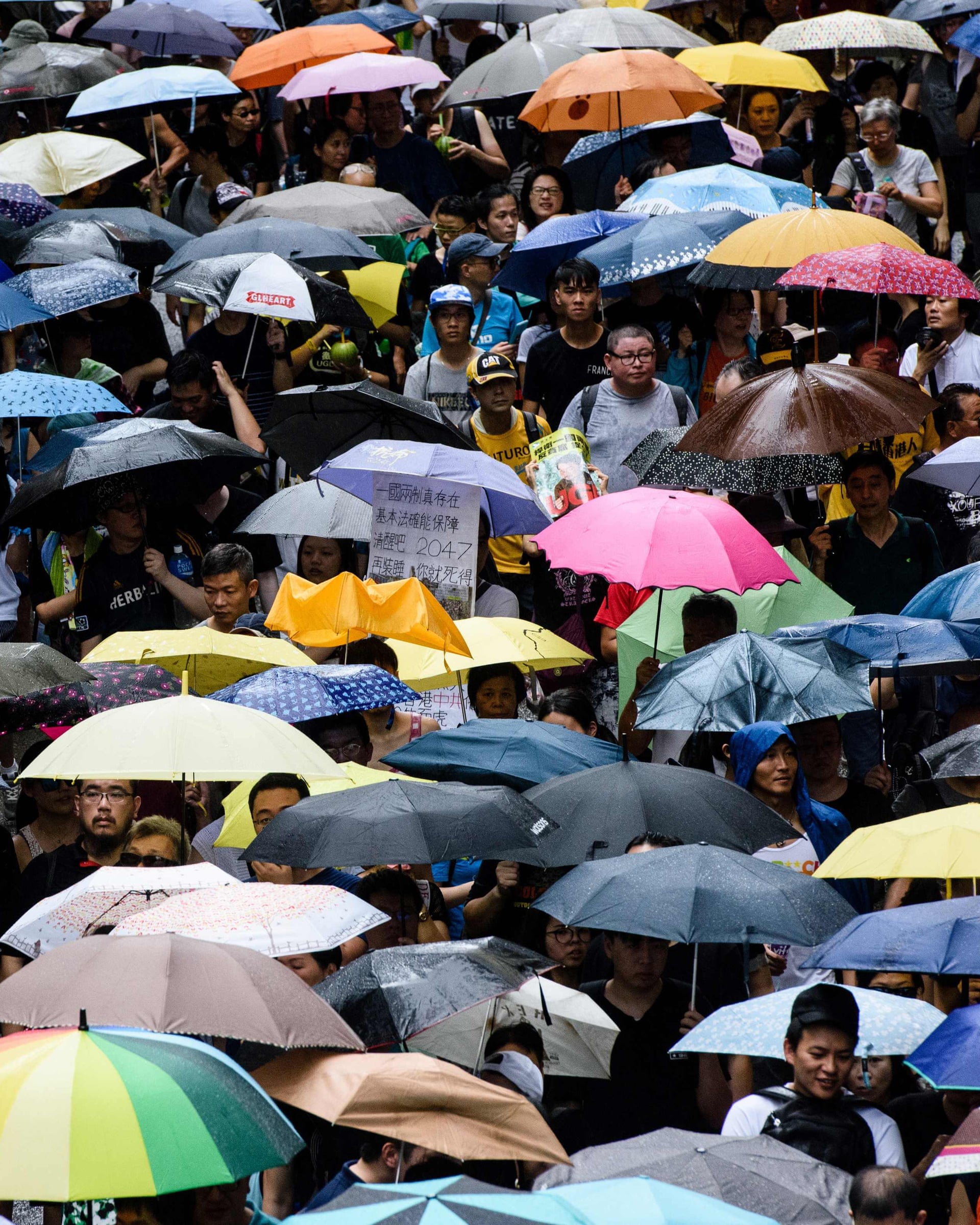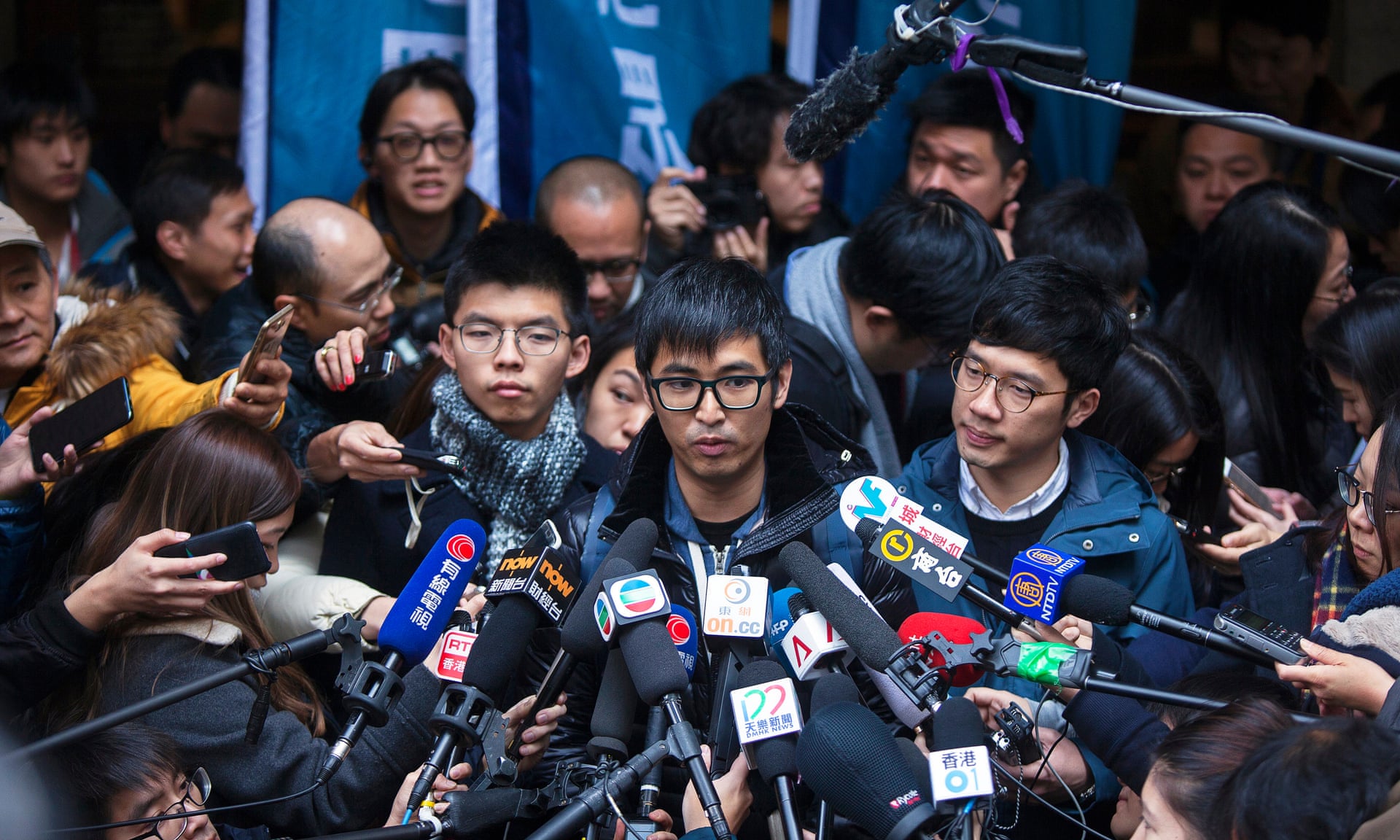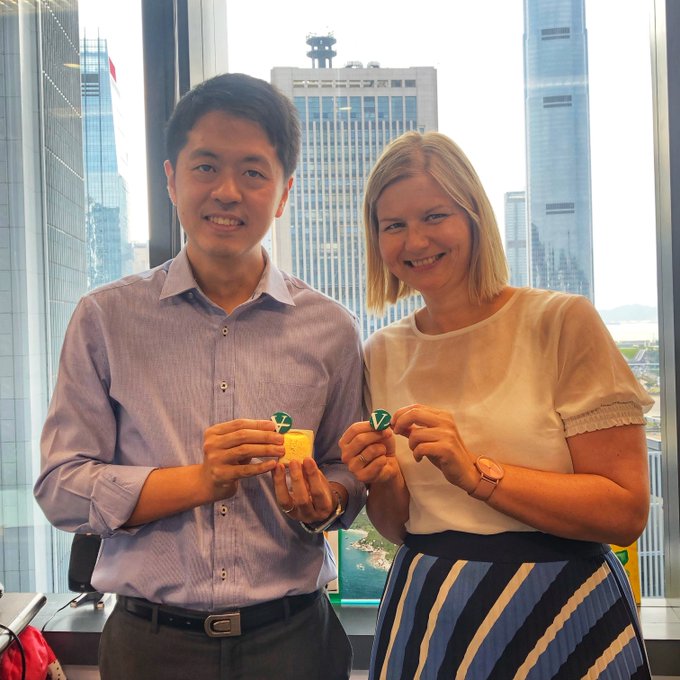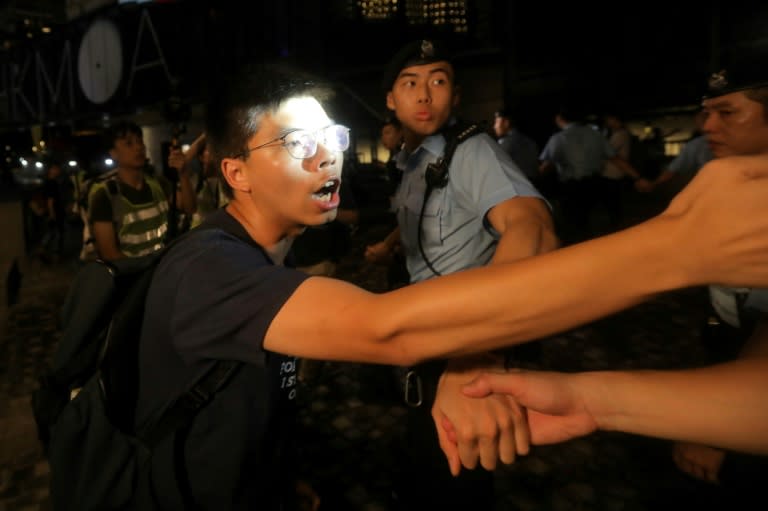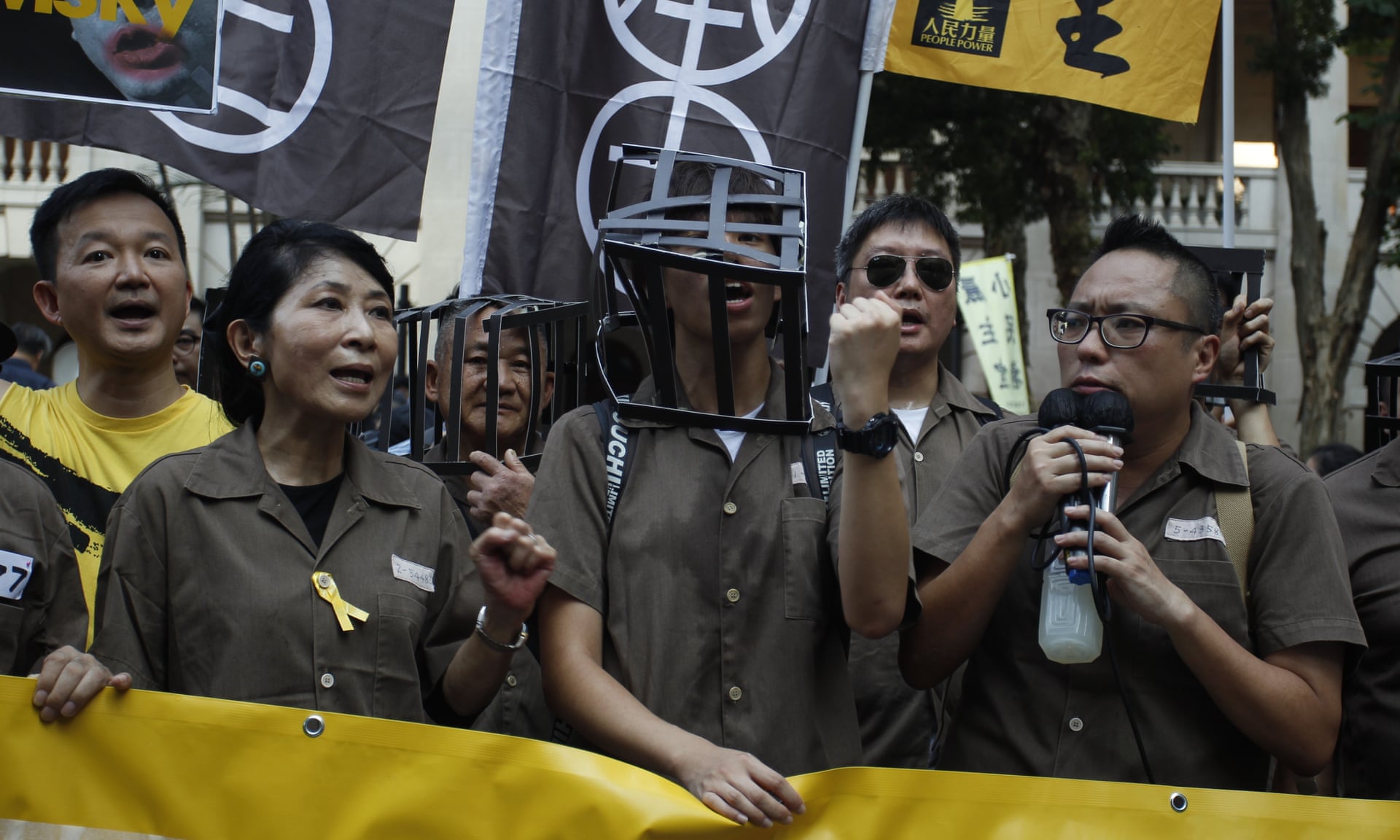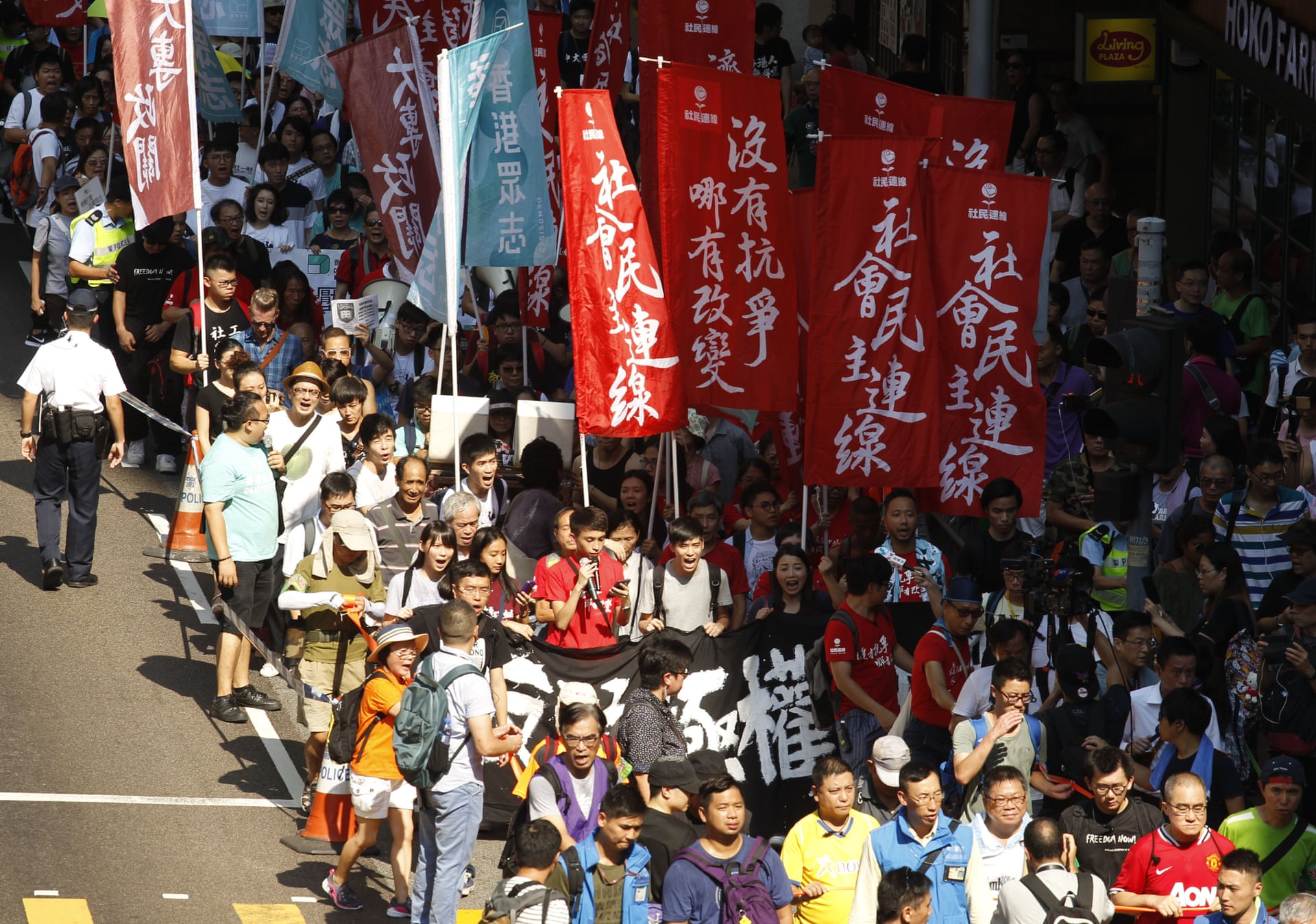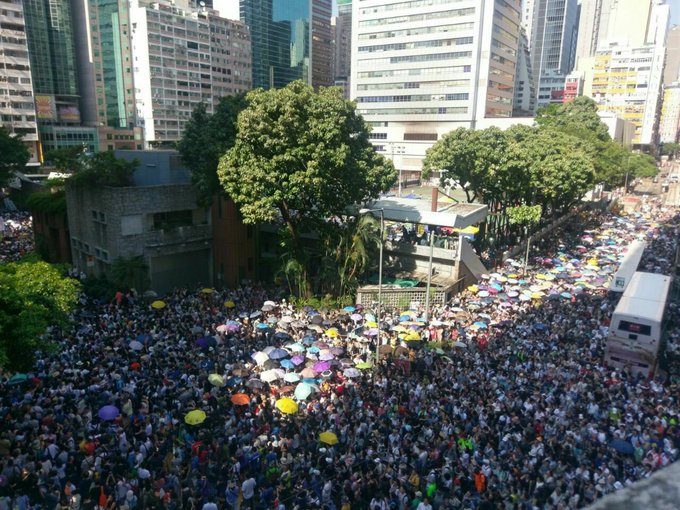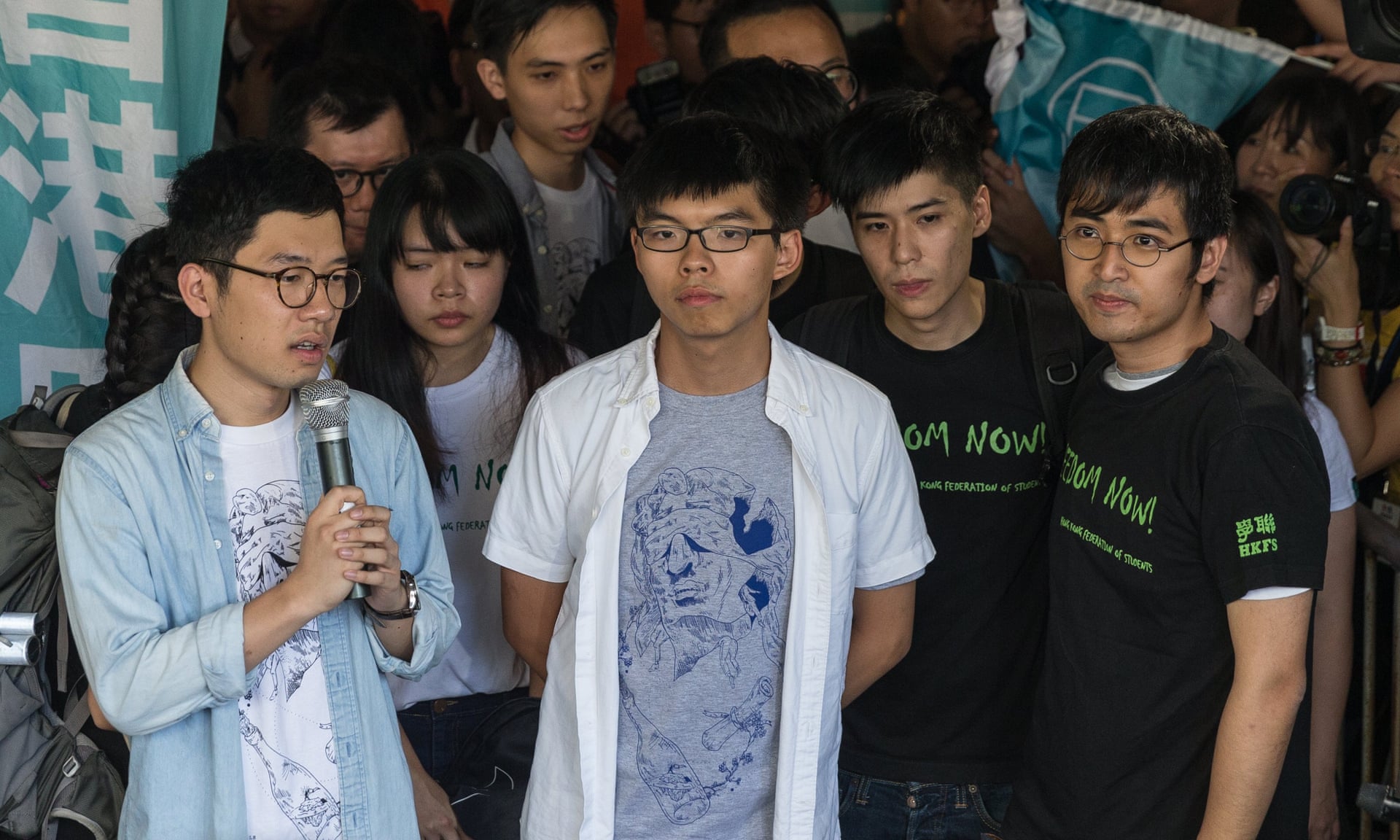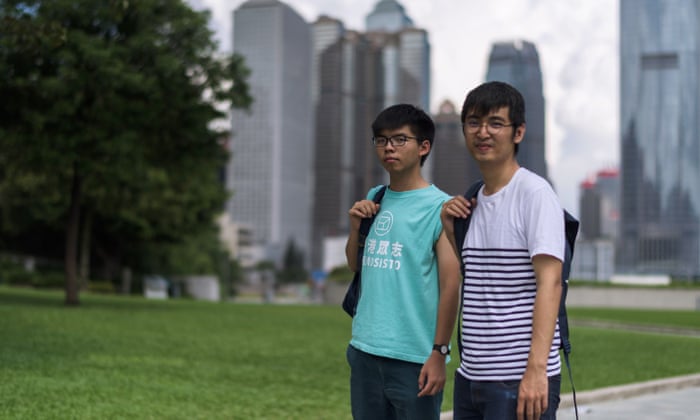Joshua Wong was 20 when he was sentenced in 2017 to six months for his role in Hong Kong’s pro-democracy ‘umbrella movement’
By Joshua Wong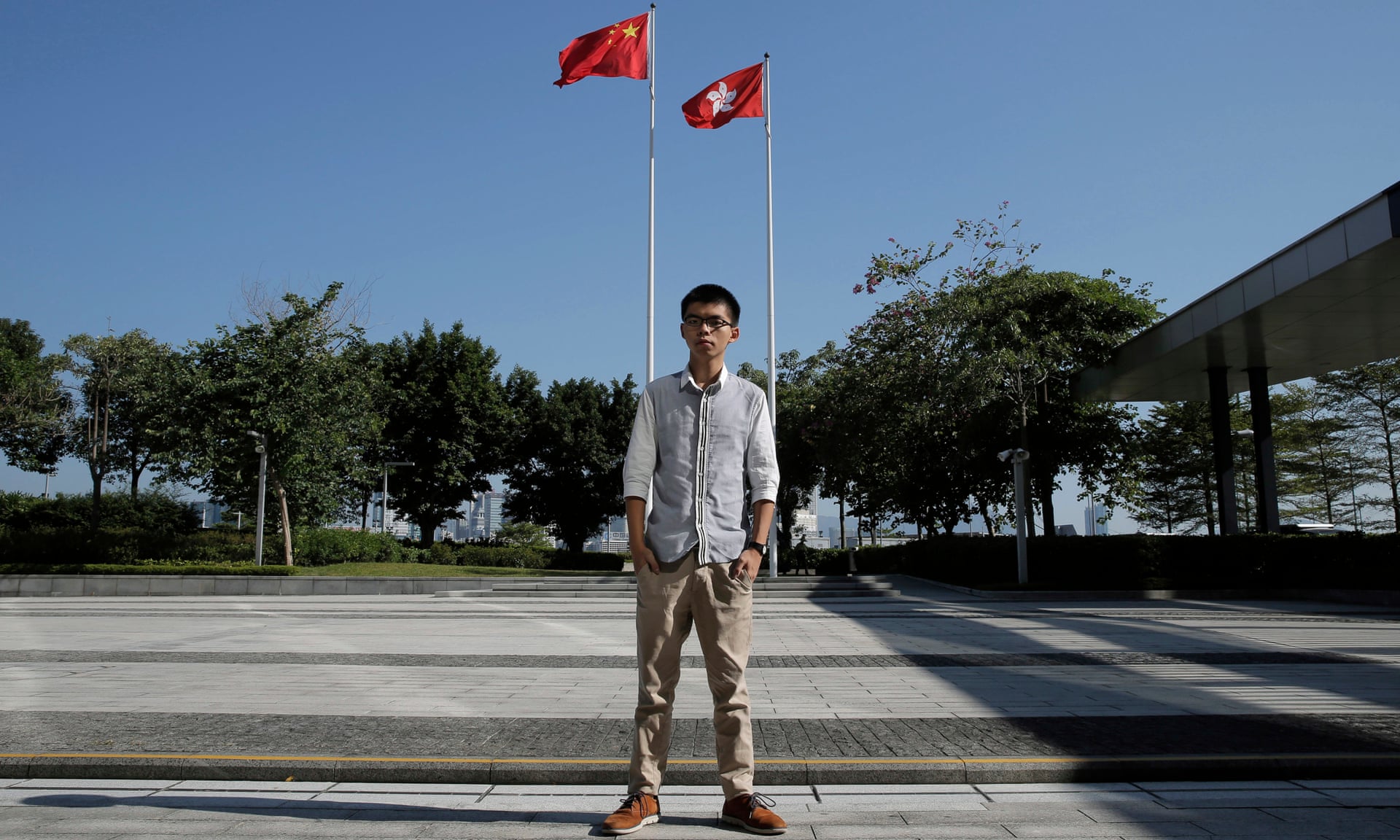
Joshua Wong outside the legislative council in Hong Kong, 2017.
DAY 2 Friday, 18 August 2017
The last words I said before I was taken away from the courtroom were: “Hong Kong people, carry on!”
That sums up how I feel about our political struggle.
Since Occupy Central – and the umbrella movement that succeeded it – ended without achieving its stated goal, Hong Kong has entered one of its most challenging chapters.
Protesters coming out of a failed movement are overcome with disillusionment and powerlessness.
The appeal sentencing of myself and my fellow umbrella leaders Nathan Law and Alex Chow has dealt yet another devastating blow to the morale of pro-democracy activists.
Even though it feels as if we have hit rock bottom, we need to stay true to our cause.
We must.
To my friends who have decided to walk away from politics, I hope my being here and writing you this letter will convince you to reconsider.
If not, our sacrifices will have been for nothing.
I miss my mum’s hand-brewed milk tea terribly, and the chicken hotpot at the street-food restaurant where my friends and I always hang out.
That’s the first place I’ll visit as soon as I’m out of here.
But at the moment, my biggest worry is the state of my political party.
Ever since Nathan and I co-founded Demosisto in April 2016 we’ve suffered a series of significant setbacks.
Four weeks ago, Nathan lost his hard-won seat at the legislative council (LegCo) after he and five other members were disqualified on the grounds that they had failed to properly recite their oaths during the swearing-in ceremony.
Nearly everyone is now out of a job, while half of our executive committee is behind bars, or will be in the coming weeks.
A pro-democracy demonstrator at Causeway Bay, Hong Kong, January 2020.
My message to the pro-Beijing camp? Don’t celebrate too soon.
I began my journey in 2012 when I led the campaign against the national education curriculum.
It’s been a tumultuous five years.
I didn’t shed a single tear when the judge announced my sentence, not because I was brave but because I wanted my supporters to embrace my loss of freedom as a necessary step on our collective path to democracy.
To quote JK Rowling’s Hagrid: “What’s coming will come and we’ll meet it when it does.”
Hong Kong is at a crossroads.
The ruling regime will stop at nothing to silence dissent.
For those who dare to stand up to them, the only way forward is together.
And tonight, alone in my cell, I ask you to keep your chin up and use your tears, anger and frustration as motivation to charge ahead. Hong Kong people, carry on!
DAY 3 Saturday, 19 August 2017
I’ve been assigned a two-person cell.
My cellmate seems friendly enough, although we didn’t have a chance to say much to each other before the lights went out.
So far the biggest source of discomfort is perhaps the bed.
In fact, calling it a bed is an over-statement.
It’s nothing more than a wooden plank with no mattress.
But, then again, if I could spend 79 nights sleeping on a highway during the umbrella movement I’m sure I can get used to this too.
Twice a day, the news is broadcast on the PA system.
This morning I was woken up by a story about Chris Patten, the last governor of Hong Kong.
“Mr Patten told reporters that he was heartened by the sacrifices made by Joshua Wong, Alex Chow and Nathan Law, and that he believed these three names will be carved into history ...”
It felt surreal to hear my name mentioned.
The reality that I’m a convicted criminal has finally sunk in.
DAY 8 Thursday, 24 August 2017
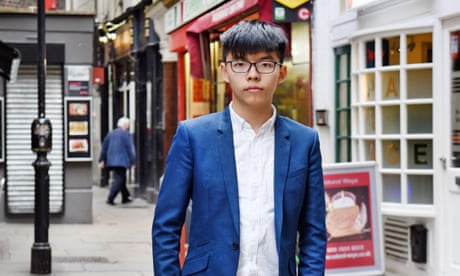
Joshua Wong, the student who risked the wrath of Beijing: ‘It’s about turning the impossible into the possible’
I feel a little embarrassed about the enormous media attention that Alex, Nathan and I received last week.
Local newspapers plastered my picture on their front pages the day after I was sent to prison.
The reality is that countless others are being tried or are about to be tried in Hong Kong for their activism work.
Many face much harsher prison terms than we do.
Being phoneless is like having my limbs cut off or an itch I can’t scratch.
DAY 9 Friday, 25 August 2017
LegCo member Shiu Ka-chun, nicknamed “Bottle”, came to see me this morning.
I met him six years ago, when I was a 14-year-old secondary school student and he a social worker and radio presenter.
He later hosted some of my anti-national education rallies.
In the documentary Netflix made about me, Joshua: Teenager vs Superpower, there is a scene in which I appear on Bottle’s radio show and he asks if I have a girlfriend.
“My mum told me it’s too early for me to be dating,” I reply, and everyone in the studio bursts out laughing.
Neither of us would have guessed that five years later we would be talking to each other on different sides of a glass partition.
DAY 10 Saturday, 26 August 2017
A prison supervisor approached me this afternoon for a chat about recent news events.
He began by declaring himself to be an “independent”, and that he’s neither a “yellow ribbon” (a supporter of the umbrella movement) nor a “blue ribbon” (a supporter of the government and the police).
He asked me whether I had any regrets about entering politics and ending up behind bars, before launching into a 30-minute monologue on my conviction.
His point – if there was one: we all got what we asked for.
A protest march on 1 July 1 2017, coinciding with the 20th anniversary of the city’s handover from British to Chinese rule.
DAY 11 Sunday, 27 August 2017
Like every other day since I arrived, a handful of inmates and I spent most of today sweeping the 2,000-sq ft canteen.
We clean after every breakfast, lunch and dinner.
Most twentysomethings in Hong Kong live with their parents and many middle-class households have a live-in maid.
My family is no exception.
I’ve never cleaned this much in my life and I keep telling myself that it’s good for my character.
Twice a day, a senior correctional officer visits the facility.
All inmates have to stand in a straight line with our chests out, make a fist with both hands, and stare, not straight ahead, but 45 degrees upwards.
DAY 15 Thursday, 31 August 2017
Today I had my first dreaded morning march.
I’m scrawny and spend nearly all my spare time playing video games and watching Japanese anime.I don’t go out much and I’ve never been athletic or particularly coordinated.
I’ll be lucky to get through the march without embarrassing or hurting myself.
DAY 18 Sunday, 3 September 2017
Three years ago, I joined hundreds of thousands of brave citizens in the largest political movement in Hong Kong’s history with the simple goal to bring true democracy to our city.
We asked to exercise our constitutional right to elect our own leader through a fair and open election. Not only did the Hong Kong government – appointed by Beijing and under its direction – ignore our demands, it also arrested and charged many of us with illegal assembly.
Until recently, the charge of unlawful assembly was used only to prosecute members of local gangs. In the past, the term “political prisoner” conjured up frightening images of dissidents in mainland China being rounded up and thrown into jail.
It’s hard to imagine that the term now also applies to Hong Kong.
As Beijing’s long arm reaches into every corner and threatens our freedoms and way of life, the number of prisoners of conscience is only going to increase.
Unfortunately, few foreign governments are willing to take on the world’s second largest economy and hold its actions to account.
For instance, I was disheartened by the latest Six-Monthly Report on Hong Kong published by the British foreign secretary, Boris Johnson.
Despite the political persecution of activists like me, he concluded that the “one country, two systems” framework was “working well”.
As a signatory to the Sino-British joint declaration on Hong Kong, Britain has both a moral and a legal obligation to defend its former subjects and speak up on their behalf.
DAY 27 Tuesday, 12 September 2017
More than one inmate has asked me: “How much do they pay you to do your political stuff?”
At first I thought they just wanted to provoke me with accusations that I take money from foreign governments.
But I’ve slowly realised the questions are genuine.
Most people don’t understand why any sane person would risk prison to do what I do if it wasn’t for money.
DAY 41 Tuesday, 26 September 2017
Today is the third anniversary of my Civic Square siege, the event that set in motion the umbrella movement and a turning point in my life.
This time three years ago, I scaled a metal fence near the government headquarters and called on other protesters to follow me.
I was tackled by a dozen police officers and taken into custody.
Wong (left), with Alex Chow (centre) and Nathan Law outside Hong Kong’s court of final appeal, February 2018.
DAY 66 Saturday, 21 October 2017
There’s a huge variety of political views here.
The younger prisoners tend to be yellow ribbons.
Several of them have opened up to me about their involvement in the umbrella movement and subsequent protests.
But there are plenty of hardcore blue ribbons too.
Yesterday someone from the security unit pulled me aside and told me that some older guys in the workshop had heckled me and yelled “Traitor” when I walked past.
I received letters from a few university classmates today.
We started in the same year and now they’re about to graduate.
By summer next year they’ll be starting their first jobs, moving ahead in life.
DAY 68 Monday, 23 October 2017
My last day in prison came and went like any other.
By the time I’m released I’ll have spent 69 days behind bars.
They represent an important milestone in my seven-year journey in political activism.
I’ll come out of prison stronger and more committed to our cause than ever.
It felt as if it was the umbrella movement all over again, except this time protesters were angrier and more combative.
Young people’s voices went from loud to deafening as they refused to be brushed aside as they had in 2014. Street demonstrations escalated quickly after million person marches failed to move politicians. Peaceful rallies soon gave way to full-scale urban guerrilla warfare.
A new cold war is brewing between China and the rest of the democratic world, and Hong Kong is holding the line in one of its first battles.
Nothing captures that tension more vividly than the moments on 1 October 2019 when live coverage of the 70th anniversary celebrations in Beijing were shown side by side with scenes of demonstrators braving teargas and throwing eggs at Xi Jinping’s portraits on the streets of Hong Kong.
The contrast sends a clear message to the world that China’s tightening grip on Hong Kong is part of a much broader threat to global democracy.
In May 2019, I went to prison for the second time.
I spent seven weeks at Lai Chi Kok Correctional Institution for violating a court injunction during the umbrella movement.
I tried to comfort my parents and joked that my biggest regret was having to miss the opening night of Avengers: Endgame, the sequel to Avengers: Infinity War.
Before I headed to prison, a foreign reporter asked me for a soundbite about my second incarceration and China’s crackdown on pro-democracy activists in general.
I thought about the discussion I had with my parents and said: “This isn’t our endgame. Our fight against the CCP is an infinity war.”
The infinity war that has ravaged Hong Kong for years, I am afraid, may be coming soon to a political theatre near you.
• Edited extract from Unfree Speech by Joshua Wong and Jason Y Ng, published by WH Allen (RRP £9.99) on 30 January. To order a copy go to guardianbookshop.com. Free UK p&p over £15.
My message to the pro-Beijing camp? Don’t celebrate too soon.
I began my journey in 2012 when I led the campaign against the national education curriculum.
It’s been a tumultuous five years.
I didn’t shed a single tear when the judge announced my sentence, not because I was brave but because I wanted my supporters to embrace my loss of freedom as a necessary step on our collective path to democracy.
To quote JK Rowling’s Hagrid: “What’s coming will come and we’ll meet it when it does.”
Hong Kong is at a crossroads.
The ruling regime will stop at nothing to silence dissent.
For those who dare to stand up to them, the only way forward is together.
And tonight, alone in my cell, I ask you to keep your chin up and use your tears, anger and frustration as motivation to charge ahead. Hong Kong people, carry on!
DAY 3 Saturday, 19 August 2017
I’ve been assigned a two-person cell.
My cellmate seems friendly enough, although we didn’t have a chance to say much to each other before the lights went out.
So far the biggest source of discomfort is perhaps the bed.
In fact, calling it a bed is an over-statement.
It’s nothing more than a wooden plank with no mattress.
But, then again, if I could spend 79 nights sleeping on a highway during the umbrella movement I’m sure I can get used to this too.
Twice a day, the news is broadcast on the PA system.
This morning I was woken up by a story about Chris Patten, the last governor of Hong Kong.
“Mr Patten told reporters that he was heartened by the sacrifices made by Joshua Wong, Alex Chow and Nathan Law, and that he believed these three names will be carved into history ...”
It felt surreal to hear my name mentioned.
The reality that I’m a convicted criminal has finally sunk in.
DAY 8 Thursday, 24 August 2017

Joshua Wong, the student who risked the wrath of Beijing: ‘It’s about turning the impossible into the possible’
I feel a little embarrassed about the enormous media attention that Alex, Nathan and I received last week.
Local newspapers plastered my picture on their front pages the day after I was sent to prison.
The reality is that countless others are being tried or are about to be tried in Hong Kong for their activism work.
Many face much harsher prison terms than we do.
Being phoneless is like having my limbs cut off or an itch I can’t scratch.
DAY 9 Friday, 25 August 2017
LegCo member Shiu Ka-chun, nicknamed “Bottle”, came to see me this morning.
I met him six years ago, when I was a 14-year-old secondary school student and he a social worker and radio presenter.
He later hosted some of my anti-national education rallies.
In the documentary Netflix made about me, Joshua: Teenager vs Superpower, there is a scene in which I appear on Bottle’s radio show and he asks if I have a girlfriend.
“My mum told me it’s too early for me to be dating,” I reply, and everyone in the studio bursts out laughing.
Neither of us would have guessed that five years later we would be talking to each other on different sides of a glass partition.
DAY 10 Saturday, 26 August 2017
A prison supervisor approached me this afternoon for a chat about recent news events.
He began by declaring himself to be an “independent”, and that he’s neither a “yellow ribbon” (a supporter of the umbrella movement) nor a “blue ribbon” (a supporter of the government and the police).
He asked me whether I had any regrets about entering politics and ending up behind bars, before launching into a 30-minute monologue on my conviction.
His point – if there was one: we all got what we asked for.
A protest march on 1 July 1 2017, coinciding with the 20th anniversary of the city’s handover from British to Chinese rule.
DAY 11 Sunday, 27 August 2017
Like every other day since I arrived, a handful of inmates and I spent most of today sweeping the 2,000-sq ft canteen.
We clean after every breakfast, lunch and dinner.
Most twentysomethings in Hong Kong live with their parents and many middle-class households have a live-in maid.
My family is no exception.
I’ve never cleaned this much in my life and I keep telling myself that it’s good for my character.
Twice a day, a senior correctional officer visits the facility.
All inmates have to stand in a straight line with our chests out, make a fist with both hands, and stare, not straight ahead, but 45 degrees upwards.
DAY 15 Thursday, 31 August 2017
Today I had my first dreaded morning march.
I’m scrawny and spend nearly all my spare time playing video games and watching Japanese anime.I don’t go out much and I’ve never been athletic or particularly coordinated.
I’ll be lucky to get through the march without embarrassing or hurting myself.
DAY 18 Sunday, 3 September 2017
Three years ago, I joined hundreds of thousands of brave citizens in the largest political movement in Hong Kong’s history with the simple goal to bring true democracy to our city.
We asked to exercise our constitutional right to elect our own leader through a fair and open election. Not only did the Hong Kong government – appointed by Beijing and under its direction – ignore our demands, it also arrested and charged many of us with illegal assembly.
Until recently, the charge of unlawful assembly was used only to prosecute members of local gangs. In the past, the term “political prisoner” conjured up frightening images of dissidents in mainland China being rounded up and thrown into jail.
It’s hard to imagine that the term now also applies to Hong Kong.
As Beijing’s long arm reaches into every corner and threatens our freedoms and way of life, the number of prisoners of conscience is only going to increase.
Unfortunately, few foreign governments are willing to take on the world’s second largest economy and hold its actions to account.
For instance, I was disheartened by the latest Six-Monthly Report on Hong Kong published by the British foreign secretary, Boris Johnson.
Despite the political persecution of activists like me, he concluded that the “one country, two systems” framework was “working well”.
As a signatory to the Sino-British joint declaration on Hong Kong, Britain has both a moral and a legal obligation to defend its former subjects and speak up on their behalf.
DAY 27 Tuesday, 12 September 2017
More than one inmate has asked me: “How much do they pay you to do your political stuff?”
At first I thought they just wanted to provoke me with accusations that I take money from foreign governments.
But I’ve slowly realised the questions are genuine.
Most people don’t understand why any sane person would risk prison to do what I do if it wasn’t for money.
DAY 41 Tuesday, 26 September 2017
Today is the third anniversary of my Civic Square siege, the event that set in motion the umbrella movement and a turning point in my life.
This time three years ago, I scaled a metal fence near the government headquarters and called on other protesters to follow me.
I was tackled by a dozen police officers and taken into custody.
Wong (left), with Alex Chow (centre) and Nathan Law outside Hong Kong’s court of final appeal, February 2018.
DAY 66 Saturday, 21 October 2017
There’s a huge variety of political views here.
The younger prisoners tend to be yellow ribbons.
Several of them have opened up to me about their involvement in the umbrella movement and subsequent protests.
But there are plenty of hardcore blue ribbons too.
Yesterday someone from the security unit pulled me aside and told me that some older guys in the workshop had heckled me and yelled “Traitor” when I walked past.
I received letters from a few university classmates today.
We started in the same year and now they’re about to graduate.
By summer next year they’ll be starting their first jobs, moving ahead in life.
DAY 68 Monday, 23 October 2017
My last day in prison came and went like any other.
By the time I’m released I’ll have spent 69 days behind bars.
They represent an important milestone in my seven-year journey in political activism.
I’ll come out of prison stronger and more committed to our cause than ever.
* * *
In June 2019, on the heels of the 30th anniversary of the Tiananmen Square massacre, a controversial fugitive transfer arrangement with China tabled by the government set off a fresh round of protests.It felt as if it was the umbrella movement all over again, except this time protesters were angrier and more combative.
Young people’s voices went from loud to deafening as they refused to be brushed aside as they had in 2014. Street demonstrations escalated quickly after million person marches failed to move politicians. Peaceful rallies soon gave way to full-scale urban guerrilla warfare.
A new cold war is brewing between China and the rest of the democratic world, and Hong Kong is holding the line in one of its first battles.
Nothing captures that tension more vividly than the moments on 1 October 2019 when live coverage of the 70th anniversary celebrations in Beijing were shown side by side with scenes of demonstrators braving teargas and throwing eggs at Xi Jinping’s portraits on the streets of Hong Kong.
The contrast sends a clear message to the world that China’s tightening grip on Hong Kong is part of a much broader threat to global democracy.
In May 2019, I went to prison for the second time.
I spent seven weeks at Lai Chi Kok Correctional Institution for violating a court injunction during the umbrella movement.
I tried to comfort my parents and joked that my biggest regret was having to miss the opening night of Avengers: Endgame, the sequel to Avengers: Infinity War.
Before I headed to prison, a foreign reporter asked me for a soundbite about my second incarceration and China’s crackdown on pro-democracy activists in general.
I thought about the discussion I had with my parents and said: “This isn’t our endgame. Our fight against the CCP is an infinity war.”
The infinity war that has ravaged Hong Kong for years, I am afraid, may be coming soon to a political theatre near you.
• Edited extract from Unfree Speech by Joshua Wong and Jason Y Ng, published by WH Allen (RRP £9.99) on 30 January. To order a copy go to guardianbookshop.com. Free UK p&p over £15.
